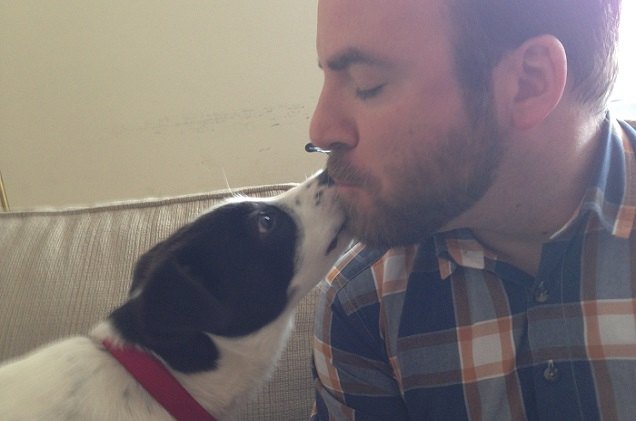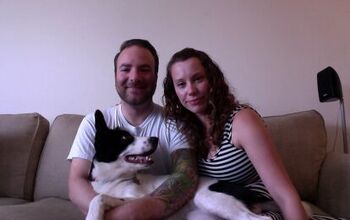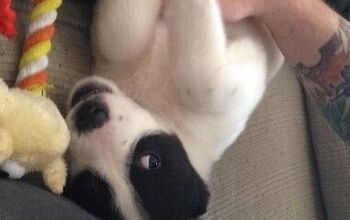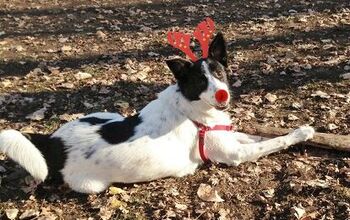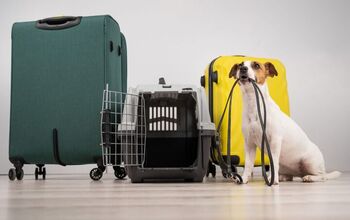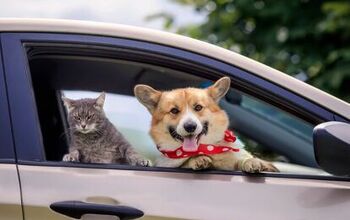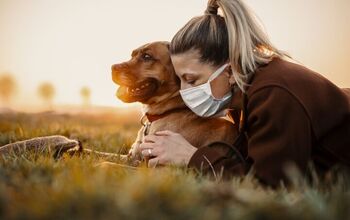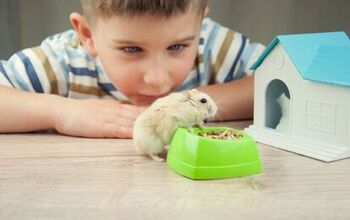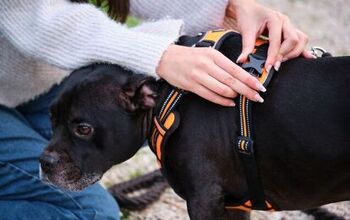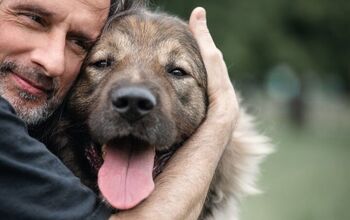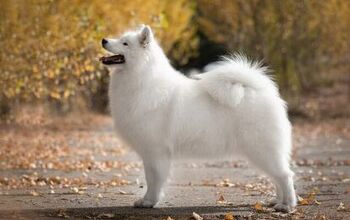Gen Y Dogma – Compromising Pet Parenting Styles

Raising a dog in a two-parent household, you need to come to some agreement on what style pet parenting you’re going to employ. If you don’t work as a team, mayhem will ensue. This week, Christina Peden talks about how she and her boyfriend, Ryan, differ when it comes to parenting their pup, Matilda.
It’s not like Ryan and I sat down and discussed child-rearing methodologies before bringing Matilda home. And in hindsight, maybe we should have? It just isn’t one of those things that automatically occurs to you when you decide to adopt a dog.
This week (with special guest commentator Ryan), I’m going to delve into a few big differences in puppy parenting styles that we’ve discovered in the past few months, what we’ve learned along the way and some advice for couples thinking about adopting a puppy.
- He’s super laid back; I’m a worrywart
When it comes to Matilda, Ryan is pretty relaxed about things. That doesn’t mean he lets her get away with murder, but he doesn’t treat her with kid gloves or constantly assume the worst is going to happen (nope; that’s me!). He’ll give her a little more leeway on the flexi-leash when he’s walking her, because he trusts that she isn’t going to dart into the street or jump on a passing pedestrian because she wants to play.
I am almost the complete opposite of that, though I’ve loosened up a lot in the past few months (ummm … I think). I’m totally paranoid that something terrible is going to happen to Matilda. What if she does dart into the road and a car comes? What if another dog attacks her at the dog park? She loves kids, but she’s still wrapping her brain around the fact that she’s not a tiny puppy anymore. What if she jumps on a kid at the park, wanting to play, but accidentally knocks them down and hurts them? This is just a sample of my near-constant train of thought when we’re out with Matilda. And I’ve gotta say — it’s exhausting.
Ryan says: “I’ve spent more time with Matilda [because I work from home], and I’m more aware of her behavior. It’s not that I’m convinced she isn’t going to dart into traffic, but I know her triggers (squirrels, other dogs, etc.), and keep an eye out for those.”
- He’s the ‘bad cop’; I’m the ‘good cop’ (most of the time)
Despite being laid back, Ryan is definitely the more authoritative one. Also, Matilda listens to him just a little bit more than she does with me. Cesar Millan says that dogs will sometimes more easily accept a man as ‘pack leader’ because they have a deeper voice and often, a more dominating presence. (Not say that women can’t be the dominant ones — that’s a whole other conversation!) When Ryan tells Matilda “No!”, or asks herto stop doing something, her response is almost immediate. She stops doing the thing that’s making Daddy upset
Me? There are definitely occasions where I have to say, “No” or, “Stop it!” more than twice to Matilda (not always, but sometimes). I know she’s trying to test my limits to see what she can get away with, and honestly? Sometimes I’m a pushover with her. And I know I shouldn’t be, because it sets a bad precedent; I don’t want her to think she doesn’t have to listen to me at all, but sometimes I just can’t seem to steel my resolve and be firm with her.
Ryan says: “I follow through on reprimands – consistently. The moment you don’t exercise consistency in training, she learns that she can do what she wants. Telling her once isn’t gonna do it, it’s drilling into her puppy brain that x=y, all the time.”
- He likes to roughhouse with the dog; I’m a bit more… gentle
Ryan (and I think this is true for most guys) likes to wrestle with Matilda, play fight and tease her a bit (in a nice, playful way of course; not in a cruel way). She’ll bare her teeth and pretend to be aggressive, and sometimes she’ll ‘mouth’ his arm (and mine too) when she gets excited. It doesn’t normally hurt, but occasionally she gets carried away and chomps a bit too hard. Don’t get me wrong, it’s not like she draws blood or even really hurts, but it’s just enough to make it uncomfortable. All we have to say is, “Ow!” and she’ll stop immediately. She knows what “Ow!” means and instantly feels terrible. She’ll even start trying to lick our faces as an apology!
That said, I do worry (as you can probably tell, worry is a pretty consistent theme with me) that she will one day be playing with someone else and accidentally hurt them. It’s one thing when it’s Ryan and I, but it’s a whole other ballgame when it’s someone she doesn’t know. They won’t know that she’s only trying to play and wouldn’t hurt a fly. (Well, that’s not true. She might hurt an actual fly. The more likely scenario is that she’d try to eat it.) Like I said, Matilda still doesn’t quite realize how big she is now, and it’s not like she’s a holy terror, but we’re still working on the finer points of her social graces.
Ryan says: “Matilda’s getting much better at recognizing different scenarios. She nips and mouths at us because she knows it’s been established that it’s OK to play that way with us. The only time she uses her mouth on any other person is when they invite it through their actions. It’s the same with dogs she meets. She’s very good at reading whether another dog wants to play or not, and reacts accordingly.”
So, what have we learned?
Speaking for myself, I’ve definitely learned to relax a little bit. I’ll probably never be quite as chilled out as Ryan, but I’ve learned that Matilda is not a China doll and is smarter than I give her credit for (i.e. she mostly knows it’s not okay to run into the street).
Together, I’d say we’ve learned to compromise and be more understanding of one another. I’ve had to let go and place a little more trust in Ryan that cutting Matilda some slack on the leash isn’t going to mean instant death.
Let me leave you with some parting wisdom from Ryan on parenting your puppy:
“I’ve learned that it’s a give and take situation. With consistent training and commands, I start to feel comfortable to “give” her a bit more freedom to explore her environment, try new things and basically be a dog. If she fails to listen or displays behavior she knows is unacceptable, I “take” away that freedom. It might be slack on the leash, or time at the dog park, or just being allowed on the couch. She’s a smart dog and never ceases to impress us with how much she continues to learn every day. And I don’t want to stifle her spirit. I’d rather we all learn together how to have a good relationship, with limits. It’s like a sandbox: stay in the box, and I won’t mind if you dig in the sand a little.”
Christina Peden is a lifelong animal lover and avid wordsmith. She lives in Toronto with her boyfriend Ryan where they are proud pet parents to puppy, Matilda and cat, Oscar. In her spare time, she can be found enjoying Toronto, Canada’s all-too-short patio season, taking advantage of the city’s numerous parks or curled up with a good book.

Christina Peden is a lifelong animal lover and avid wordsmith. She lives in Toronto with her boyfriend Ryan where they are proud pet parents to puppy, Matilda and cat, Oscar. In her spare time, she can be found enjoying Toronto, Canada's all-too-short patio season, taking advantage of the city's numerous parks or curled up with a good book.
More by Christina Peden



